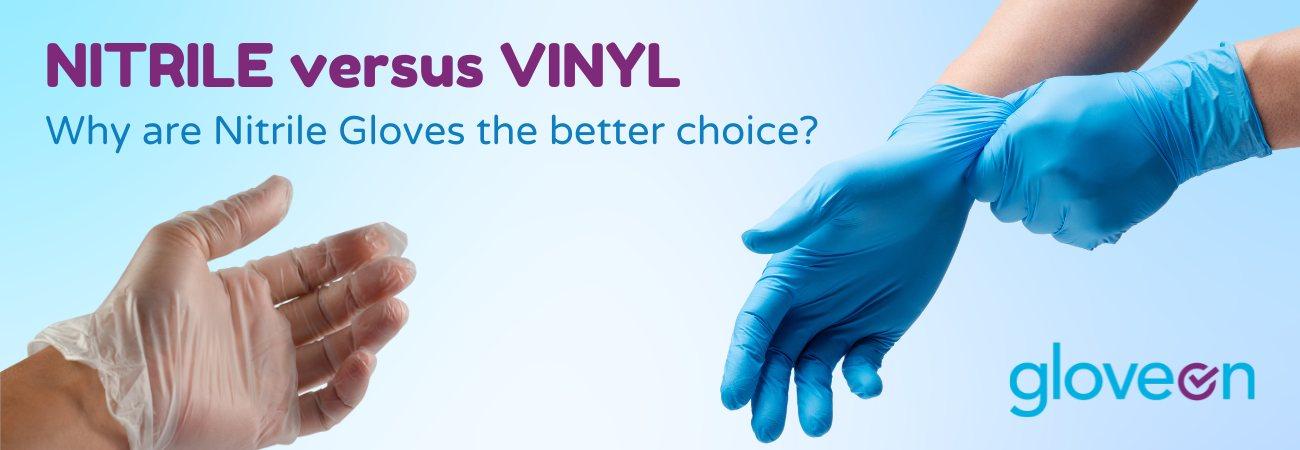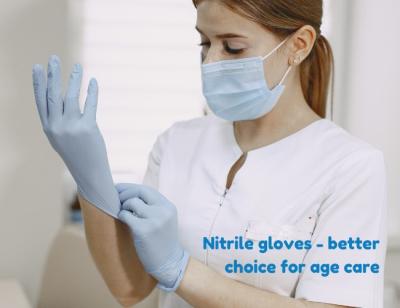
A Better Alternative to Vinyl Gloves in Aged Care
In the aged care industry, ensuring the highest standards of hygiene and safety is crucial. While vinyl gloves have been a staple for many years, they may not always provide the best protection and comfort for both caregivers and residents. Here, we explore why switching to nitrile gloves is a better choice for aged care facilities.
Why Vinyl Gloves Fall Short?
Vinyl gloves, often made from polyvinyl chloride (PVC), have been a popular choice due to their low cost and ease of use. However, they come with several significant drawbacks:
- Limited Durability: Vinyl gloves are prone to tearing and puncturing, especially during tasks that require fine motor skills. This can compromise the safety of both caregivers and residents.
- Poor Fit and Comfort: These gloves often do not fit as well as other types, leading to discomfort during extended use. A poor fit can also reduce dexterity, making it harder for caregivers to perform delicate tasks.
- Chemical Exposure: Vinyl gloves can contain plasticisers such as phthalates, which may pose health risks with prolonged exposure. In an environment where the well-being of residents is paramount, this is a significant concern.
- Environmental Impact: PVC production and disposal generate harmful chemicals and contribute to environmental pollution. As the aged care sector increasingly focuses on sustainability, this is an important consideration.

The Advantages of Nitrile Gloves
Nitrile gloves offer a superior alternative to vinyl gloves, addressing many of the issues outlined above. Here’s why nitrile gloves are particularly suited for aged care settings:
- Enhanced Durability and Protection: Nitrile gloves are more resistant to punctures and tears. This robustness ensures better protection during various caregiving tasks, from handling medical equipment to performing daily care routines.
- Superior Comfort and Fit: Designed to conform to the shape of the hand, nitrile gloves offer a snug fit that enhances comfort and dexterity. This improved fit helps caregivers perform tasks more efficiently and comfortably.
- Hypoallergenic Properties: Nitrile is free from latex proteins and plasticisers that can cause allergic reactions. This makes nitrile gloves a safer option for both caregivers and residents, particularly those with sensitive skin or allergies.
- Chemical Resistance: Nitrile gloves provide excellent resistance to a wide range of chemicals, including cleaning agents and disinfectants commonly used in aged care facilities. This ensures that caregivers are protected from potential irritants.
- Environmentally Friendlier: While no disposable glove is completely eco-friendly, nitrile gloves are considered a better choice compared to vinyl. They do not release harmful chemicals during production or disposal, making them a more sustainable option.
Switching to nitrile gloves in aged care facilities is a wise decision that enhances safety, comfort, and environmental responsibility. By choosing nitrile gloves, caregivers can ensure they are providing the best possible care to residents while also protecting their own health. For aged care providers committed to maintaining high standards of care and sustainability, nitrile gloves are the superior choice.
Surgical House stocks a range of nitrile gloves including GloveOn Biodegradable Gloves, COATS with an colloidal oat lining and more.
Click to explore entire GLOVEON range
available from Surgical House.
Content for this article was supplied by Mun Australia.
Disclaimer
This website does not provide medical advice. The information, including but not limited to, text, graphics, images, and other material contained on this website,
is for informational purposes only. No material on this site is intended to be a substitute for professional medical advice, diagnosis, or treatment.
Always seek the advice of your physician or other qualified health care provider with any questions you may have regarding a medical condition or treatment and before
undertaking a new health care regimen. Never disregard professional medical advice or delay in seeking it because of something you have read on this website.


